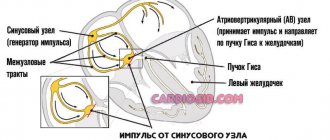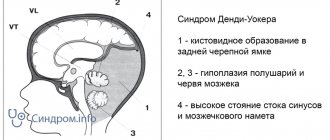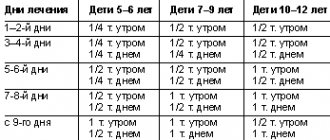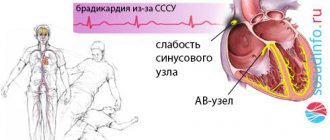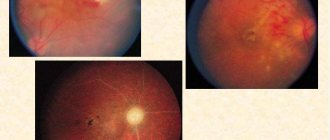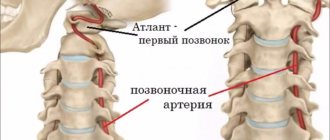Weakness
is a subjective feeling of lack of energy in everyday situations. Complaints of weakness usually arise when actions that were previously familiar and natural suddenly begin to require special effort.
Weakness is often accompanied by symptoms such as dizziness, confusion, drowsiness, headaches or muscle pain.
Fatigue at the end of a working day or after performing a long or complex job cannot be considered a weakness, since such fatigue is natural for the body. Normal fatigue goes away after rest; healthy sleep and well-spent weekends help a lot. But if sleep does not bring cheerfulness, and a person, having just woken up, already feels tired, then there is a reason to consult a doctor.
Causes of weakness
Weakness can be caused by a number of reasons, including:
- avitaminosis. Weakness is often caused by a lack of vitamin B12, which is essential for making red blood cells (RBCs) and preventing anemia, and is also important for cell growth. Vitamin B12 deficiency leads to the development of anemia, which is considered the most common cause of general weakness. Another vitamin whose deficiency leads to weakness is vitamin D. This vitamin is produced by the body when exposed to sunlight. Therefore, in autumn and winter, when daylight hours are short and the sun does not appear often, a lack of vitamin D may be the cause of weakness;
- depression;
- thyroid diseases. Weakness can occur with both increased thyroid function (hyperthyroidism) and decreased function (hypothyroidism). With hypothyroidism, as a rule, there is weakness in the arms and legs, which is described by patients as “everything falls out of hand”, “legs give way”. With hyperthyroidism, general weakness is observed against the background of other characteristic symptoms (nervous excitability, hand tremors, elevated temperature, rapid heartbeat, weight loss while maintaining appetite);
- vegetative-vascular dystonia;
- chronic fatigue syndrome, indicating extreme depletion of vitality;
- Celiac enteropathy (celiac disease) is the inability of the intestines to digest gluten. If at the same time a person consumes products made from flour - bread, pastries, pasta, pizza, etc. – manifestations of indigestion develop (flatulence, diarrhea), accompanied by constant fatigue;
- diabetes;
- diseases of the cardiovascular system;
- oncological diseases. In this case, weakness is usually accompanied by low-grade fever;
- lack of fluid in the body. Weakness often comes in the summer during hot weather, when the body loses a lot of water, and it is not possible to restore the water balance in time;
- some medications (antihistamines, antidepressants, beta blockers).
An attack of weakness can also occur in the following cases:
- trauma (with large blood loss);
- brain injury (in combination with neurological symptoms);
- menses;
- intoxication (including infectious diseases such as influenza).
Consequences of drug therapy
Some types of medications cause increased drowsiness, headaches, dry mouth and other unpleasant side effects. These drugs primarily include antipsychotics, tranquilizers, and antidepressants. The craving for sleep is also increased by some medications prescribed for hypertension, in particular, these include clonidine, amlodipine, and condiline.
Most previous generation antihistamines prescribed for the treatment of allergies have a hypnotic and sedative effect. These are diphenhydramine, pipolfen, suprastin, tavegil. Some drugs reduce concentration. When you stop taking the medication, all negative symptoms disappear.
Weakness and dizziness
Dizziness quite often occurs against a background of general weakness. A combination of these symptoms may occur in the following cases:
- anemia;
- cerebrovascular accidents;
- a sharp increase or decrease in blood pressure;
- oncological diseases;
- stress;
- in women - during menstruation or menopause.
Diagnostics
Lethargy is a symptom of many diseases, so the primary examination is carried out by a general practitioner. The diagnostic plan involves a combination of laboratory and instrumental studies designed to find or exclude a possible cause of lethargy. The most informative ones are:
- Blood test
. In the general analysis, nonspecific signs of inflammation are revealed; sharp changes in the number of platelets indicate disturbances in the hemostatic system. Biochemical analysis is carried out to determine the level of protein and individual protein fractions, acute phase indicators. The immunogram is designed to exclude allergic reactions. - Hormonal profile
. In women, the levels of progesterone and estrogen must be examined, and, if necessary, the amount of FSH and LH, prolactin. To exclude thyroid diseases, the levels of free thyroxine, triiodothyronine, and pituitary thyroid-stimulating hormone are assessed. Additionally, the insulin concentration is determined. - Bacteriological analysis
. Often lethargy is a sign of infectious diseases, so culture of blood and sputum on selective nutrient media is required. For express diagnostics, microscopy of the smear is performed after staining with aniline dyes. Serological tests are used to confirm the diagnosis, especially for viral infections. - X-ray imaging
. To assess the condition of the kidneys, plain radiography and excretory urography are performed. To exclude damage to brain tissue, it is prescribed, which makes it possible to identify focal formations or diffuse inflammatory changes. Magnetic resonance imaging is used to detail the affected area. - Additional methods
. In order to exclude bronchial asthma, spirography and a bronchodilation test with salbutamol are necessary. If neurological causes of illness are suspected, the reactions of the autonomic nervous system are examined, deep and superficial reflexes are studied. Women are advised to undergo a comprehensive gynecological examination.
Weakness and drowsiness
Patients often complain that they want to sleep, but do not have enough strength for normal life activities. The combination of weakness and drowsiness is possible for the following reasons:
- lack of oxygen. The urban atmosphere is poor in oxygen. Constant stay in the city contributes to the development of weakness and drowsiness;
- decrease in atmospheric pressure and magnetic storms. People who are sensitive to weather changes are called weather dependent. If you are weather dependent, bad weather may cause your weakness and drowsiness;
- avitaminosis;
- poor or unhealthy diet;
- hormonal disorders;
- alcohol abuse;
- chronic fatigue syndrome;
- vegetative-vascular dystonia;
- other diseases (including infectious ones - in the early stages, when other symptoms have not yet appeared).
CNS lesions
Any brain damage caused by infection, trauma, postoperative complications or systemic diseases can lead to the development of drowsiness. Associated symptoms:
- headache;
- fatigue;
- lethargy;
- violation of attention and active orientation;
- change in facial expressions.
Drowsiness develops as you fall into a coma. Patients in a state of partial unconsciousness complain of headache, nausea, dizziness, aggravated by bright light and loud sounds.
Drowsiness also occurs when poisoned by poisons that affect the central nervous system. As a result of exposure to endogenous or exogenous toxins, depression of the central nervous system occurs. The person complains of weakness, headache, lethargy, and blurred vision. In some cases, drowsiness is replaced by bouts of excitement, after which severe fatigue sets in. The listed symptoms are alarming and indicate the need for emergency medical care.
Weakness: what to do?
If weakness is not accompanied by any disturbing symptoms, you can improve your well-being by following these recommendations:
- provide yourself with a normal amount of sleep (6-8 hours a day);
- keep a daily routine (go to bed and get up at the same time);
- try not to be nervous, relieve yourself of stress;
- exercise, provide yourself with optimal physical activity;
- spend more time in the fresh air;
- optimize your nutrition. It should be regular and balanced. Avoid fatty foods. If you are overweight, try to get rid of it;
- make sure to drink enough water (at least 2 liters per day);
- quit smoking and limit your alcohol consumption.
Why do you always feel sleepy in the fall?
In autumn, hours decreases . Sunny summer days are replaced by cloudy weather. A person receives less ultraviolet radiation. The production of the hormone melatonin, which is involved in regulating the body’s circadian rhythms, decreases. If it is deficient, the biological clock does not work as accurately, and it is difficult for a person to fall asleep in the evening, wake up in the morning, and want to sleep .
Melatonin is needed for the synthesis of serotonin. If its quantity decreases, the body produces less of the joy hormone, and the person feels unhappy for no apparent reason.
It is genetically determined that in preparation for winter , the body accumulates fat reserves. Because of this, your appetite increases and you crave high-calorie food. In order to store fat reserves, he strives to reduce physical activity, resulting in greater weakness , apathy, and drowsiness.
This is a natural seasonal phenomenon. There is no need to be afraid of your condition or create additional stress by going on a strict diet or increasing physical activity. Don't be afraid to gain 2-3 kg. A slight increase in body weight reduces the risk of colds and flu. And it’s easier to regain your previous weight in the spring, when your biorhythms change again and you feel a surge of energy.
When should you see a doctor if you feel weak?
If weakness does not go away within a few days or, moreover, lasts more than two weeks, you should definitely consult a doctor.
You should not hesitate to consult a doctor if weakness is accompanied by symptoms such as:
- dyspnea;
- cough;
- fever, chills, increased temperature;
- stomach upset;
- sudden weight loss;
- mood changes, apathy, depression.
Brain contusion
With a brain injury, negative symptoms increase gradually, so the patient’s general well-being does not always correspond to the severity of the injuries received. Drowsiness and apathy may be the only signs indicating a pathological condition. As swelling increases, tissue compression increases, intracranial pressure increases, which causes symptoms such as headache, nausea, and vomiting. Urgent care should be called if the patient is sleeping after the injury without taking sedatives.
Which doctor should I contact about weakness?
If weakness is the main complaint, then it is best to consult a general practitioner (general practitioner or family doctor).
If you have stomach problems due to weakness, you can consult a gastroenterologist.
If weakness is accompanied by pain or discomfort in the heart area, you should consult a cardiologist.
Be prepared for the fact that you may be referred for consultation to doctors of such specialties as a hematologist, oncologist, neurologist, endocrinologist, or psychotherapist.
Treatment
Help before diagnosis
Lethargy and weakness caused by ordinary fatigue are not an indication for specific therapy. It is enough for a person to sleep 8-9 hours, and the feeling of loss of strength disappears. It is important to normalize your daily routine, try to go to bed no later than 11 pm. For dinner, it is better to choose light protein dishes and limit the consumption of strong tea and coffee in the evening. For women with premenstrual syndrome, soothing herbal teas are recommended, and for severe pain, analgesics. If lethargy is a constant concern, consultation with a specialist is necessary to clarify the cause of the ailment.
Normalizing your lifestyle will help you feel more energetic
Conservative therapy
Considering the variety of etiological factors of lethargy and malaise, medical tactics are determined only after a complete examination and verification of the cause of the disorder. As a rule, etiotropic and pathogenetic treatment is carried out, supplemented by symptomatic and restorative medications. For the treatment of diseases manifested by constant fatigue and weakness, the following drugs are usually used:
- Thyroid hormones
. To correct hypothyroidism, a synthetic analogue, levothyroxine, is prescribed; for goiter, the treatment regimen is supplemented with potassium iodide. The substance must be taken for a long time, the dosage is selected taking into account the level of T3 and T4 in the blood. - Estrogen drugs
. In menopausal women, replacement therapy with sex hormones - estrogens - is recommended to relieve symptoms. For greater effectiveness, they are combined with progesterone derivatives. - Nootropics
. With the help of nootropic drugs, they eliminate residual symptoms of severe neurological diseases, activate blood flow in the brain and improve cognitive abilities. The drugs are also effective for dyscirculatory encephalopathy. - Antidepressants
. Lethargy and apathy caused by depression are successfully treated with specific serotonin receptor agonists. For severe anxiety, tranquilizers and herbal sedatives are additionally indicated. - Vitamins
. To improve the functioning of the nervous system, thiamine and other B vitamins and the antioxidant tocopherol are used. During the period of convalescence, metabolic drugs (riboxin, etc.) have a good effect.
Phosphorus-calcium metabolism disorders
Phosphorus-calcium metabolism disorders can be suspected in persons with general and muscle weakness, bone pain, low mood, complaints of thirst, frequent urination, vomiting and diarrhea (not due to other reasons), urolithiasis, frequent recurrence of gastric and duodenal ulcers , low-traumatic (occurring with minimal trauma) fractures, muscle cramps, with chronic kidney disease, long-term use of glucocorticosteroids, with low or no insolation, including people who are completely covered with clothing for religious or national reasons or who do not leave the house.



